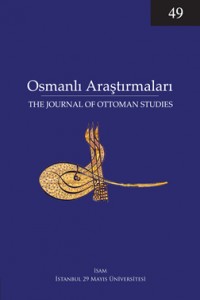Öz
The last decade or so has witnessed a rise in the scholarly output on the early Ottomans, especially within the context of the development of Ottoman historiography, with particular reference to how the Ottomans viewed themselves. Discourse on the early Ottoman state sought to no longer view the Ottomans through the lens of earlier theories on the rise of the Ottoman state such as Paul Wittek’s “Ghazi thesis”1 and instead pursued the redefining of labels of a religious and cultural nature that had previously been ascribed to the Ottomans by modern scholarship.2 It is within this context that the work under scrutiny should be considered. It is Kacar’s approach to studying of early Ottoman history that renders his book unique rather than the topic itself, which has been the subject of much scholarly debate of late. Kacar’s aim is to explore the possibility of going beyond the ‘orientalist’ and ‘colonial’ premises and descriptions of Ottoman history and to let the Ottomans speak for themselves in their own words (p. 7). In common with recent scholarly output Kacar argues that the sources of the early Ottoman state should not be utilised to bring light to modern theories on the rise of the Ottomans
Kaynakça
- Hilmi Kacar, A Mirror for the Sultan: State Ideology in the Early Ottoman Chronicles, 1300-1453, Universiteit Gent, Faculteit Letteren & Wijsbegeerte, 2015, 376 pp., no ISBN.
Öz
Kaynakça
- Hilmi Kacar, A Mirror for the Sultan: State Ideology in the Early Ottoman Chronicles, 1300-1453, Universiteit Gent, Faculteit Letteren & Wijsbegeerte, 2015, 376 pp., no ISBN.
Ayrıntılar
| Birincil Dil | İngilizce |
|---|---|
| Bölüm | Makaleler |
| Yazarlar | |
| Yayımlanma Tarihi | 16 Mart 2017 |
| Yayımlandığı Sayı | Yıl 2017 Cilt: 49 Sayı: 49 |

